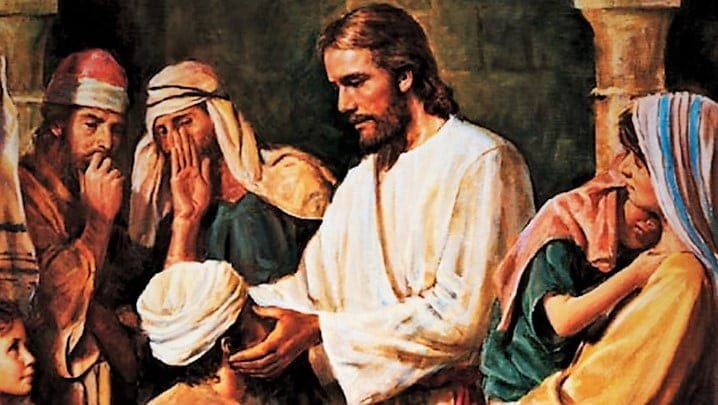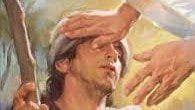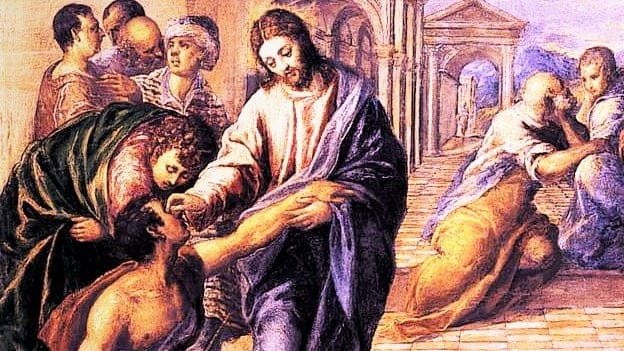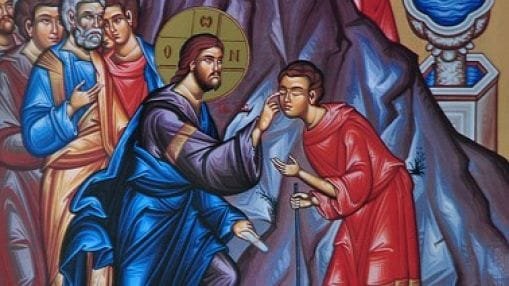POPE FRANCIS’ REFLECTION ON THE FOURTH SUNDAY OF LENT YEAR A

ANGELUS
Saint Peter’s Square
Fourth Sunday of Lent Year A, 19 March 2023
______________________________________
Dear brothers and sisters, buongiorno!
Today, the Gospel depicts Jesus giving sight to a man blind from birth (cf. Jn 9:1-41). But this wonder is badly welcomed by various people or groups. Let us look at the details.
But I would like to say: today, take the Gospel of John and read about this miracle of Jesus. The way John recounts it in chapter 9 is really beautiful. It only takes two minutes to read it. It makes us see how Jesus proceeds and how the human heart proceeds: the good human heart, the tepid human heart, the fearful human heart, the courageous human heart. Chapter 9 of the Gospel of John. Read it today. It will help you a lot. And what are the ways that these people welcome it?
First of all, there are Jesus’ disciples who, faced with the man born blind, engage in small talk and ask whether his parents or he was to blame (cf. v. 2). They look for a culprit. And we fall into this many times which is so convenient – to look for a culprit rather than asking challenging questions in life. And today, we can say: What does the presence of this man mean for us, in my life? What is this person asking of us?
Then, once the healing takes place, the reactions intensify. The first are from his neighbours who are sceptical: “This man was always blind. It is not possible that he now sees – it can’t be him! It’s someone else” – scepticism (cf. vv. 8-9). This is unacceptable to them. Better to leave everything like it was before so we do not need to face this problem (cf. v. 16). They are afraid, they fear the religious authorities and do not pronounce themselves (cf. vv. 18-21).
In all these reactions, for various reasons, there emerge hearts closed in front of the sign of Jesus: because they seek a culprit, because they do not know how to be surprised, because they do not want to change, because they are blocked by fear. Today there are many similar situations. Faced with something that is truly a testimony of a person, a message about Jesus, we fall into this – we look for another explanation, we do not want to change, we look for a more elegant way out rather than accepting the truth.
The only person who reacts well is the blind man. Happy to see, he testifies to what happened to him in the simplest way: “I was blind, now I see” (v. 25). He tells the truth. Before, he had been forced to ask for alms to live on, and suffered from the prejudice of the people: “He is poor and blind from birth. He has to suffer. He has to pay for his sins or those of his forebears”. Now free in body and spirit, he bears witness to Jesus – he neither invents nor hides anything. “I was blind and now I see”. He is not afraid of what the others will say. He had already known the bitter taste of marginalization his whole life. He had already personally experienced the indifference, the contempt of the passers-by, of those who considered him to be an outcast in society, useful at best for the pious practice of giving some alms. Now healed, he no longer fears those contemptuous attitudes because Jesus has given him his full dignity. And this is clear, it always happens when Jesus heals us. He gives us back our dignity, the dignity of the healing of Jesus, complete, a dignity that comes forth from the depths of the heart, that takes hold of one’s entire life. And, on the sabbath in front of everyone, Jesus liberated him and gave him sight without asking him for anything, not even a thank you, and he bears witness to this. This is the dignity of a noble person, of a person who knows he is healed and begins again, is reborn. That rebirth in life that they spoke about today on “A Sua Immagine”: to be reborn.
Brothers, sisters, through all these characters, today’s Gospel puts us too in the midst of the scene, so we might ask ourselves: What position do we take? What would we have said then? And above all, what will we do today? Like the blind man, do we know how to see the good and to be grateful for the gifts we receive? I ask myself: How is my dignity? How is your dignity? Do we bear witness to Jesus, or do we spread criticism and suspicion instead? Are we free when faced with prejudices or do we associate ourselves with those who spread negativity and small talk? Are we happy to say that Jesus loves us, that he saves us, or, like the parents of the man born blind, do we allow ourselves to be caged in by the fear of what others will think? Tepid hearts who do not accept the truth and do not have the courage to say, “No, it’s like this”. And further, how do we welcome the difficulties and indifference of others. How do we welcome people who have so many limitations in life? Whether they be physical, like this blind man; or social, like the beggars we find on the street? Do we welcome them like an inconvenience or as an occasion to draw near to them with love?
Brothers and sisters, today, let us ask the grace to be surprised every day by God’s gifts and to see the various circumstances of life, even the most difficult ones to accept, as occasions to do good, as Jesus did with the blind man. May Our Lady help us in this, together with Saint Joseph, the just and faithful man.
Source: https://www.vatican.va/content/francesco/en/angelus/2023/documents/20230319-angelus.html
EMPHASIS ADDED.

ANGELUS
Library of the Apostolic Palace
Fourth Sunday of Lent Year A, 22 March 2020
Dear brothers and sisters, good morning!
At the centre of the liturgy of this fourth Sunday of Lent there is the theme of light. The Gospel (cf. Jn 9:1-41) recounts the episode of the man blind from birth, to whom Jesus gives sight. This miraculous sign confirms Jesus’ affirmation that “I am the light of the world” (v. 5), the light that brightens our darkness. Jesus is thus. He operates illumination on two levels: a physical level and a spiritual level: the blind person first receives the sight of the eyes and then is led to faith in the “Son of Man” (v. 35), that is, in Jesus. It is all a journey. Today it would be good if you were all to take a copy of the Gospel according to John, chapter nine, and read this passage: it is so good and it will do us good to read it once or twice more. The wonders that Jesus performs are not spectacular gestures, but have the purpose of leading to faith through a journey of inner transformation.
The doctors of the law – who were there in a group – persist in not admitting the miracle, and ask the healed man insidious questions. But he disconcerts them with the power of reality: “One thing I do know. I was blind and now I see” (v. 25). Amidst the distrust and hostility of those who surround him and interrogate him, incredulous, he takes a route that leads him to gradually discover the identity of the One who opened his eyes and to confess his faith in Him. At first he considers Him a prophet (cf. v. 17); then he recognises Him as one Who comes from God (cf. v. 33); finally he welcomes Him as the Messiah and prostrates himself before Him (cf. vv. 36-38). He understood that by giving him sight Jesus displayed “the works of God” (cf. v. 3).
May we too have this experience! With the light of faith he who was blind discovers his new identity. He is now a “new creature”, able to see his life and the world around him in a new light, because he has entered into communion with Christ, he has entered into another dimension. He is no longer a beggar marginalised by the community; he is no longer a slave to blindness and prejudice. His path of enlightenment is a metaphor for the path of liberation from sin to which we are called. Sin is like a dark veil that covers our face and prevents us from clearly seeing ourselves and the world; the Lord’s forgiveness takes away this blanket of shadow and darkness and gives us new light. The Lenten period that we are living is an opportune and valuable time to approach the Lord, asking for His mercy, in the different forms that Mother Church proposes to us.
The healed blind man, who now sees both with the eyes of the body and with those of the soul, is the image of every baptised person, who immersed in Grace has been pulled out of the darkness and placed in the light of faith. But it is not enough to receive the light, one must become light. Each one of us is called to receive the divine light in order to manifest it with our whole life. The first Christians, the theologians of the first centuries, used to say that the community of Christians, that is the Church, is the “mystery of the moon”, because it gave light but it was not its own light, it was the light it received from Christ. We too can be “mystery of the moon”: giving light received from the sun, which is Christ, the Lord. Saint Paul reminds us of this today: “Live as children of light; for the fruit of the light consists in all goodness, righteousness and truth” (Eph 5:8-9). The seed of new life placed in us in Baptism is like the spark of a fire, which first of all purifies us, burning the evil in our hearts, and allows us to shine and illuminate. With the light of Jesus.
May Mary Most Holy help us to imitate the blind man of the Gospel, so that we can be flooded with the light of Christ and set out with Him on the way of salvation.
EMPHASIS ADDED.

ANGELUS
Saint Peter’s Square
Fourth Sunday of Lent Year A (Laetare), 26 March 2017
Dear Brothers and Sisters, Good morning!
At the centre of the Gospel this Fourth Sunday of Lent we find Jesus and a man blind from birth (cf. Jn 9:1-41). Christ restores his sight and performs this miracle with a type of symbolic ritual: first, He mixes dirt with saliva and spreads it on the blind man’s eyes; then, He orders him to go and wash in the pool of Siloam. The man goes, washes, and regains his sight. He was blind from birth. With this miracle, Jesus manifests himself, and He manifests himself to us as the Light of the World. The man blind from birth represents each one of us, who was created to know God; but due to sin has become blind; we are in need of a new light; we are all in need of a new light: that of faith, which Jesus has given us. Indeed, that blind man in the Gospel, by regaining his sight, is opened to the mystery of Christ. Jesus asks him: “Do you believe in the Son of man?” (v. 35). “And who is he, sir, that I may believe in him?”, the healed blind man replied. “You have seen him, and it is he who speaks to you” (v. 37). “Lord, I believe”, [the blind man said,] and he prostrated himself before Jesus.
This episode induces us to reflect on our faith, our faith in Christ, the Son of God; and at the same time, it also refers to Baptism, which is the first Sacrament of faith: the Sacrament which makes us “come to the light”, by being reborn through the water and through the Holy Spirit; as happens to the man born blind, whose eyes are opened after being cleansed in the water of the pool of Siloam. The man born blind and healed represents us when we do not realize that Jesus is the light; he is “the Light of the World”, when we are looking elsewhere, when we prefer to entrust ourselves to little lights, when we are groping in the dark. The fact that the blind man has no name helps us to see our face reflected and our name in his story. We too have been “illuminated” by Christ in Baptism, and thus we are called to behave as children of the light. Acting as children of the light requires a radical change of mind-set, a capacity to judge men and things according to another scale of values, which comes from God. The Sacrament of Baptism, in fact, requires the choice of living as children of the light and walking in the light. If I were to ask you: “Do you believe that Jesus is the Son of God? Do you believe that he can change your heart? Do you believe that he can show reality as he sees it, not as we see it? Do you believe that he is light, that he gives us the true light?”. How would you answer? Each of you, respond in your heart.
What does it mean to have the true light, to walk in the light? First of all it means abandoning false lights: the cold, vain light of prejudice against others, because prejudice distorts reality and ladens us with aversion to those whom we judge without mercy and condemn without appeal. This is our daily bread! When you gossip about others, you do not walk in the light, you walk in shadows. Another false light, because it is seductive and ambiguous, is that of self-interest: if we value men and things on the basis of usefulness to us, of pleasure, of prestige, we are not truthful in our relationships and situations. If we go down this path of seeking self-interest, we are walking in shadows.
May the Blessed Virgin, who was the first to welcome Jesus, the Light of the World, obtain for us this grace of welcoming anew the light of faith this Lent, rediscovering the inestimable gift of Baptism, which all of us have received. And may this new illumination transform us in attitude and action, so that we too, beginning with our poverty, our narrow-mindedness, may be bearers of a ray of the light of Christ.
EMPHASIS ADDED.

ANGELUS
Saint Peter’s Square
Fourth Sunday of Lent Year A, 30 March 2014
Dear Brothers and Sisters, Good morning,
Today’s Gospel sets before us the story of the man born blind, to whom Jesus gives sight. The lengthy account opens with a blind man who begins to see and it closes — and this is curious — with the alleged seers who remain blind in soul. The miracle is narrated by John in just two verses, because the Evangelist does not want to draw attention to the miracle itself, but rather to what follows, to the discussions it arouses, also to the gossip. So many times a good work, a work of charity arouses gossip and discussion, because there are some who do not want to see the truth. The Evangelist John wants to draw attention to something that also occurs in our own day when a good work is performed. The blind man who is healed is first interrogated by the astonished crowd — they saw the miracle and they interrogated him —, then by the doctors of the law who also interrogate his parents. In the end the blind man who was healed attains to faith, and this is the greatest grace that Jesus grants him: not only to see, but also to know Him, to see in Him “the light of the world” (Jn 9:5).
While the blind man gradually draws near to the light, the doctors of the law on the contrary sink deeper and deeper into their inner blindness. Locked in their presumption, they believe that they already have the light, therefore, they do not open themselves to the truth of Jesus. They do everything to deny the evidence. They cast doubt on the identity of the man who was healed, they then deny God’s action in the healing, taking as an excuse that God does not work on the Sabbath; they even doubt that the man was born blind. Their closure to the light becomes aggressive and leads to the expulsion from the temple of the man who was healed.
The blind man’s journey on the contrary is a journey in stages that begins with the knowledge of Jesus’ name. He does not know anything else about him; in fact, he says: “The man called Jesus made clay and anointed my eyes” (v. 11). Following the pressing questions of the lawyers, he first considers him a prophet (v. 17) and then a man who is close to God (v. 31). Once he has been banished from the temple, expelled from society, Jesus finds him again and “opens his eyes” for the second time, by revealing his own identity to him: “I am the Messiah”, he tells him. At this point the man who had been blind exclaims: “Lord, I believe!” (v. 38), and he prostrates himself before Jesus. This is a passage of the Gospel that makes evident the drama of the inner blindness of so many people, also our own for sometimes we have moments of inner blindness.
Our lives are sometimes similar to that of the blind man who opened himself to the light, who opened himself to God, who opened himself to his grace. Sometimes unfortunately they are similar to that of the doctors of the law: from the height of our pride we judge others, and even the Lord! Today, we are invited to open ourselves to the light of Christ in order to bear fruit in our lives, to eliminate unchristian behaviours; we are all Christians but we all, everyone sometimes has unchristian behaviours, behaviours that are sins. We must repent of this, eliminate these behaviours in order to journey well along the way of holiness, which has its origin in baptism. We, too, have been “enlightened” by Christ in baptism, so that, as St Paul reminds us, we may act as “children of light” (Eph 5:8), with humility, patience and mercy. These doctors of the law had neither humility, nor patience, nor mercy!
I suggest that today, when you return home, you take the Gospel of John and read this passage from Chapter nine. It will do you good, because you will thus see this road from blindness to light and the other evil road that leads to deeper blindness. Let us ask ourselves about the state of our own heart? Do I have an open heart or a closed heart? It is opened or closed to God? Open or closed to my neighbour? We are always closed to some degree which comes from original sin, from mistakes, from errors. We need not be afraid! Let us open ourselves to the light of the Lord, he awaits us always in order to enable us to see better, to give us more light, to forgive us. Let us not forget this! Let us entrust this Lenten journey to the Virgin Mary, so that we too, like the blind man who was healed, by the grace of Christ may “come to the light”, go forward towards the light and be reborn to new life.
EMPHASIS ADDED.
SEE AS WELL:
Stay updated: subscribe by email for free TO OUR NEW WEBSITE www.catholicsstrivingforholiness.org (PUT YOUR EMAIL IN THE SUBSCRIBE WIDGET).
We are also in www.fb.com/Catholicsstrivingforholiness. Kindly help more people in their Christian life by liking our page and inviting your family, friends and relatives to do so as well. Thanks in advance and God bless you and your loved ones! Fr. Rolly Arjonillo